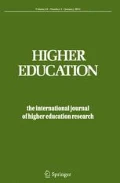Abstract
This article examines Western influence on the development of Korean higher education, which is characteristic of the predominance of adaptation to the American ideas and practices from the beginning in the late nineteenth century. The roots of American influence can be seen developmentally as representing three sets of entangled issues: the role of the early American missionaries in practice and unconstrained accommodation in resisting the Japanese oppression; the increase of American-educated scholars and their change-agent leadership; and the newly emerging definitions of nationalism and collaborative relationship between the change-agent and the indigenous group. The most probable schema to respond to the Western influences on Korean higher education is to view Western development as one of the sources challenging endogenous change, while treating it also as an influential force. The institutions of higher education in Korea are now faced with strong pressures for increased academic nationalism as well as for excellence comparable to that of Western advanced countries, dealing with the Western influences rather as a source of data for their own development.
Similar content being viewed by others
Author information
Authors and Affiliations
Rights and permissions
About this article
Cite this article
Lee, S. The emergence of the modern university in Korea. High Educ 18, 87–116 (1989). https://doi.org/10.1007/BF00138962
Issue Date:
DOI: https://doi.org/10.1007/BF00138962




